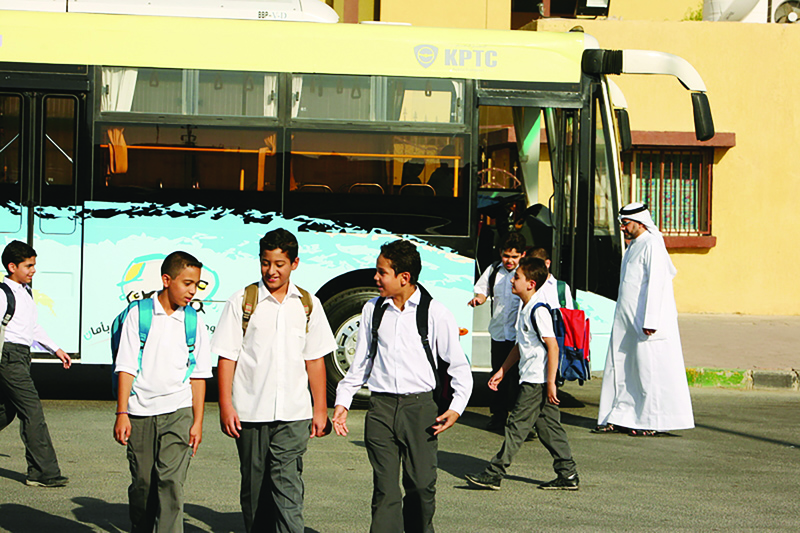 KUWAIT: Students alight from a school bus in this pre-pandemic file photo. Photo used for illustrative purposes only.
KUWAIT: Students alight from a school bus in this pre-pandemic file photo. Photo used for illustrative purposes only.
By Ben Garcia
KUWAIT: Children across Kuwait will start returning to school from Sept 26, and the education ministry as well as public and private schools are busy making preparations. One issue, however, remains undecided, and has left parents worried about the return to on-campus learning. School buses may or may not be allowed by the ministry to operate, and so far there is no clarity on the issue.
"To this date, we have no clear guidance on the matter of transportation services for our students," the registrar of a private Arabic school told Kuwait Times. "We are waiting for a memorandum from the ministry of education. Normally, we charge fees for transportation services along with the tuition fees, but currently we are deferring receiving payment for transportation services from our students," she said.
"Earlier, it was announced no school buses will be allowed. But we do not know whether that previous announcement is still in force for the current school year. We informed parents that they will have to send their kids to school by private vehicles or taxis and pick them up on time after school. Until the ministry comes up with a new announcement, we cannot do anything. Parents must bring their kids on time and be able to take them back after classes," she said.
The lack of a clarity on the matter of busing is a major concern for parents who work or don't have private transportation. Rasha, a Syrian working mother, said this has been a hot subject on online parent groups. "The school said we have to wait for the announcement from the government whether they will allow school buses or not. I am sure if there are no buses, it will be very hard for me since I am a working mom," she said.
"I can take my children to school, but how to get them home afterwards? I cannot run from Shuwaikh to the school just to pick them up. Besides, my office timings are from 9 am to 5 pm. If I go out earlier, maybe my boss will cut my salary. I hope busing will be allowed," she said. "Plus, imagine the traffic jam in October if there are no school buses!"
The logistics for on-campus learning are expected to create headaches for everyone - administrators, teachers, parents and students. Education Minister Ali Al Mudhaf had announced that public schools will resume face-to-face-classes on Oct 3 (most private schools have already started the new school year online). But students will be divided into two groups. Group A will attend on-campus classes, while group B will learn from home. The two groups will alternate, with one group going to school for three days in the first week and then two days in the second week, so that both groups can attend school for five days over the course of two weeks.
The fate of on-campus classes for private schools will depend on their readiness and how they prepare for this hybrid model. Each school will enforce its own plan. In the case of on-campus classes, schools are advised to reduce the number of students per class. Authorities have also mandated school administrations to implement a one-meter distance between students.
Unvaccinated students and teachers will have to present a negative PCR test every Sunday. School canteens will remain closed, although the education ministry has created a list of food items students can bring with them in school. All the restrictions, however, pale in comparison to the problems with online learning. Most parents can't wait for their children to return to school in person, even if it means no canteen and no busing.
Many parents are now scrambling to find ridesharing options. Sujith, an Indian who has three children returning to campus this October, said he has spoken to a friend who also has two children in the same school. "We agreed to share transportation. I will take all the kids in the morning, and in the afternoon my friend will pick them up from school. In this way, we can resolve our biggest problem of transportation," he said.
.jpg)



